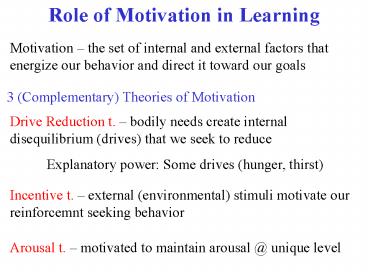Role of Motivation in Learning - PowerPoint PPT Presentation
1 / 18
Title:
Role of Motivation in Learning
Description:
... 30 yrs ago, 00s of operant conditioning studies had shown that extrinsic rewards ... Effect explainable by std operant principles ' ... – PowerPoint PPT presentation
Number of Views:173
Avg rating:3.0/5.0
Title: Role of Motivation in Learning
1
Role of Motivation in Learning
Motivation the set of internal and external
factors that energize our behavior and direct it
toward our goals
3 (Complementary) Theories of Motivation
Drive Reduction t. bodily needs create internal
disequilibrium (drives) that we seek to
reduce Explanatory power Some drives (hunger,
thirst)
Incentive t. external (environmental) stimuli
motivate our reinforcemnt seeking behavior
Arousal t. motivated to maintain arousal _at_
unique level
2
Intrinsic vs. Extrinsic Motivation
Intrinsic motivation process of doing something
provides the reinforcement
Extrinsic motivation outcome of an activity
provides the reinforcement
Undermining effect decrease in intrinsically
motivated behavior following extrinsic
reinforcement and withdrawal
3
Overjustification effect
- Lepper , Greenee Nisbett 73
- 69 Preschoolers use markers to draw
- 1/2 get Good Player ribbons
- After 1 week, withdraw ribbons interest level
- Why?
- Overemphasize importance of extrinsic motivation
gt adjust behavior to - resist control
- treat as work and readjust cost/benefit ratio
4
Overjustification EffectWhy Worry?
- Even 30 yrs ago, 00s of operant conditioning
studies had shown that extrinsic rewards could
control bx. - As a result, bx. change programs using extrinsic
rewards were introduced widely in various applied
settings. - From 1971 to now gt 100 studies asked whether
college, high school and nursery school-age
students intrinsic motivation could be reduced
by use, then withdrawal, of extrinsic reinforcers.
- Thus, in education, do extrinsic reinforcers
adversely impact student learning by reducing
intrinsically motivated behaviors?
5
Criticisms of Undermining Effect
Overjustification Explanation
- Intrinsic motivation is obscure
- Effect explainable by std operant principles
- Intrinsic behaviors are culturally valued gt
get generalized praise - Loss of control in response to performance
independent rewards leads to learned
helplessness.
6
Undermining Effect of Extrinsic Reinforcement
- Cognitive theory Tangible rewards tend to have
a substantially negative effect on intrinsic
motivation
7
LearningBiological and Cognitive Aspects
Biological preparedness Taste aversion Instinctu
al drift
Cognitive learning Latent learning Observational
learning
8
Garcia Koelling, 1966
John Garcia
Garcia and Koelling (1966) Same 2 stimuli can
be differentially effective in different contexts
Compound CS Taste and audiovisual stimuli
US Taste Aversion (Poison)
US Paw Shock
Compound CS Taste and audiovisual stimuli
9
Results
- Poison Group Greater aversion to the taste
stimulus - Shock group Greater aversion to the audiovisual
stimulus - T/F
- Taste more effective when aversion is poison
- Audiovisual more effective when aversion is shock
- Garcia Important to know something about CS- US
relationship
10
CS-US Pairings Matter
11
Conditioned Taste Aversions
- Widespread across species
- Rapid onset
- Long CS-US delays
- Long duration
- CS-US pairings matter
- CS is species-relevant
12
Human Taste Aversion
- Generally prevelant in humans
- is higher for college-age respondents
- Chemotherapy studies
- Role of US/Role of CS
- Role of Learned Food Aversions in Anorexia
13
Cognitive Learning
Latent learning learning that occurs in absence
of an obvious reward
Edward Tolman 1886-1959
3 Groups Controls fed at completion of maze
(upon reaching goal) Group 1 no food at
goalever Group 2 no food at goal until days
11, 12, etc.
14
Tolmans Latent Learning, 1930
LL Continuous learning (reinforcement not
necessary) but demonstrated only when reward is
present
15
Tolmans Cognitive Maps, 1945
Purposive behavior in place vs. response learning
16
Observational Learning(Social Learning Theory)
"Learning would be exceedingly laborious, not to
mention hazardous, if people had to rely solely
on the effects of their own actions to inform
them what to do. Fortunately, most human behavior
is learned observationally through modeling
Albert Bandura 1925 -
Bobo doll experiments
24 children each in 1/3 (aggressive model, gentle
model, no model) groups
Observed either gentle, aggressive or no model
17
Bobo Doll Experiment Bandura, Ross Ross (1961)
18
Bobo Doll Experiment Bandura, Ross Ross (1961)

